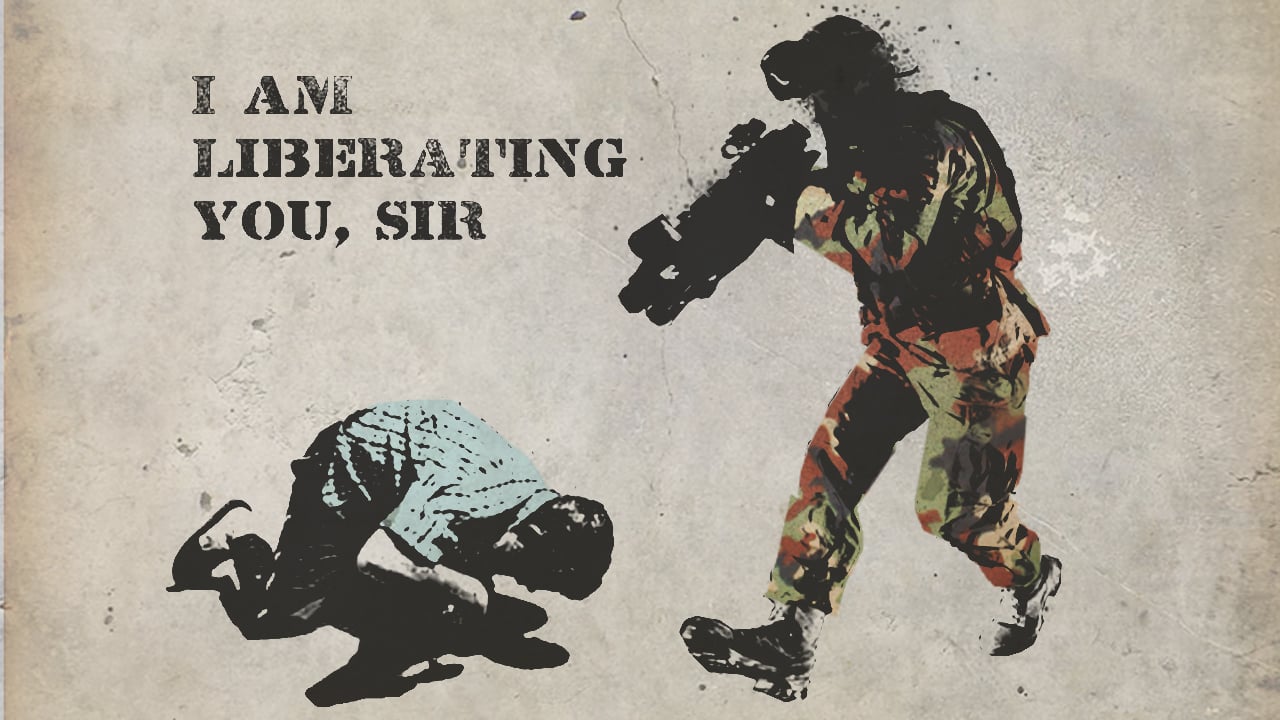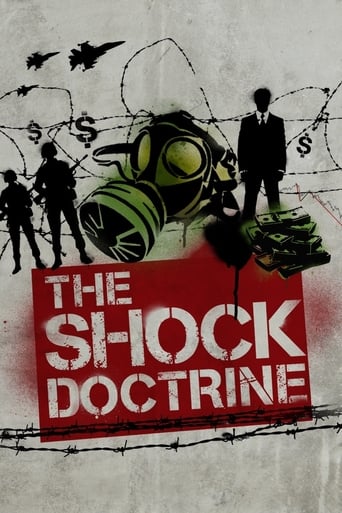

Best movie ever!
... View MoreThe thing I enjoyed most about the film is the fact that it doesn't shy away from being a super-sized-cliche;
... View MoreBlistering performances.
... View MoreOne of the worst ways to make a cult movie is to set out to make a cult movie.
... View MoreIt is as old as humankind is, but we only react when our stomachs are empty (and that is not a privilege of Marxist regimes). All over the world the ordinary people look the other way when told that actions have always been taken to control our planet (and of course its economy). I was not surprised with what I saw and heard in this fine documentary, but my info about the who, what, where and when of the whole Neoliberalism business was too vague. Therefore, when I see a film like this I appreciate to be illustrated, but I am mainly surprised at the wickedness of some human beings. My only regret is that "The Shock Doctrine" is a product from a specific time; it was made in the first decade of this century, so it ends with the Obama government. Nevertheless, the information it gives us is still valid to analyze the present. If you prefer to label this as leftist, propaganda or biased thought, well, it is your right to do so and believe in what you want. From my perspective, I do believe that such option leads us all to remain blindfold. I do not pretend things are exactly as described here, but the film does help to make us aware, a bit wiser and conscious that our rights are violated on a daily basis. We best stop believing it happens in "other countries". All of us, up and down, left and right, white and black, are subject to the decisions of evil, greedy persons, persons as those that were expelled from the temple in the Bible, as those that complain about the holocaust they were victim of, without thinking about all the wrong they do to people around the globe with their avaricious economic plans.
... View MoreThis formidable movie based on Naomi Klein's mightily important book, explains how the financial 'elite' uses shocks (crises) for implementing its 'free market' gospel, or, better, to increase its economic power and concomitantly its own financial interests.Economics (general shocks) In his mightily important book 'The Secrets of the Federal Reserve', E. Mullins reveals how the financial 'elite' manipulated market prices and provoked the Wall Street Crash of 1929. What they didn't foresee was the gigantic economic slump and the massive unemployment that would follow the crash. The US government had to intervene in the economy with a 'New Deal': breaking up the banking system and impose regulations and governmental interventions in the economy. The 'New Deal' weakened significantly the grip of the financial oligarchy on the US economy. The 'free market' gospel propagated by the Chicago School of Economics (Milton Friedman) is nothing less than a frontal attack on the legislation provided by the New Deal. The gospel defends deregulation and privatization of the economy instead of regulation and governmental intervention (through its institutions and enterprises). The gospel tries to prove and to justify that free market policies (the old order) are far better than those imposed by a government. The implementation of a deregulated and privatized (by selling off government possessions) economy was first tested in Chile and Argentina after military coups (shocks). It didn't work. The deregulation of the US financial system ended in a worldwide financial collapse of the banking system, which had to be bailed out by governmental intervention (the people's money) at a staggering cost of thousand of billions of dollars worldwide, a mind-boggling anti-shock treatment. Psychiatrics, psychology (personal shocks) The movie starts with the experiments of Ewen Cameron on psychiatric patients in Canada. He tried to control (break) the minds and to reprogram (clear) the psyche of his patients with electroshocks and drugs. His methods are now used on political prisoners ('terrorists'). By creating shocks (heavy bombardments, grotesque lies, false flag operations) and also after 'natural' shocks (floods) the 'elite' tries to instill fear into the population in order to control their will, to implement their policies and, in fine, to prevent or to obstruct the establishment or the functioning of a real democracy.Reactions Reactions against 'elite' shock doctrine policies must come from 'below', from the people, whose money was squandered in order to bail out the reckless speculations of 'too big to fail' mentalities. The solution will not come from those who want to 'fight' climate change by commodifying the atmosphere (trading carbon dioxide emissions).This movie and its extras are a must see for all those who want to understand the world we live in.
... View MoreThe numerous examples provided in this documentary very effectively support the conclusions that Klein is making. This is NOT a conspiracy film by any stretch. This is just a history lesson that has you draw your own conclusions. It makes a major point that should be no surprise to any of us - that "shocks" have been opportunistic to the powers that are determined to promote their success above the general welfare. I appreciate this documentary because it focuses on important truths that too many of us refuse to accept even though the evidences are overwhelming. The documentary might be a little overwhelming for someone who is not familiar with the facts presented since they are presented in such volume so quickly. The documentary could have easily been twice as long, but I suppose that is what the book is for.
... View MoreAfter watching this film with a few friends (one of which was a former World bank employee), we had a rather mixed and somewhat heated conversation in the cinema bar. The film is basically a summary of the book, which talks about the ideas of Milton Friedman and how they have been used to influence world affairs. However, for those of you who may find the film 'superficial' I would recommend the book, as there is much more detail. Regarding the objectivity of the film, I don't believe that it's anti-American or anti-capitalistic (as my world bank friend remarked). Quite the contrary, it is very balanced and in my opinion Klein does not point a finger at a company without first presenting the facts. I think what a lot of pro-capitalists probably find annoying about Klein is that she brings the whole idea of multinational dirty dealings and currents affairs into the spotlight. After all, Halliburton, Shell, BP, the World bank etc. are far from angels when it comes to making money! I for one, commend the producers of this film and Mrs. Klein for a job well done!
... View More